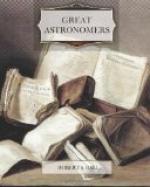[Plate: Flamsteed’s house.]
Flamsteed gives an interesting account of his travels in Ireland. They dined at Naas on the first day, and on September 8th they reached Carlow, a town which is described as one of the fairest they saw on their journey. By Sunday morning, September 10th, having lost their way several times, they reached Castleton, called commonly Four Mile Waters. Flamsteed inquired of the host in the inn where they might find a church, but was told that the minister lived twelve miles away, and that they had no sermon except when he came to receive his tithes once a year, and a woman added that “they had plenty enough of everything necessary except the word of God.” The travellers accordingly went on to Cappoquin, which lies up the river Blackwater, on the road to Lismore, eight miles from Youghal. Thence they immediately started on foot to Assaune. About a mile from Cappoquin, and entering into the house of Mr. Greatrackes, they saw him touch several patients, “whereof some were nearly cured, others were on the mending hand, and some on whom his strokes had no effect.” Flamsteed was touched by the famous quack on the afternoon of September 11th, but we are hardly surprised to hear his remark that “he found not his disease to stir.” Next morning the astronomer came again to see Mr. Greatrackes, who had “a kind of majestical yet affable presence, and a composed carriage.” Even after the third touching had been submitted to, no benefit seems to have been derived. We must, however record, to the credit of Mr. Greatrackes, that he refused to accept any payment from Flamsteed, because he was a stranger.
Finding it useless to protract his stay any longer, Flamsteed and his friend set out on their return to Dublin. In the course of his journey he seems to have been much impressed with Clonmel, which he describes as an “exceedingly pleasantly seated town.” But in those days a journey to Ireland was so serious an enterprise that when Flamsteed did arrive safely back at Derby after an absence of a month, he adds, “For God’s providence in this journey, His name be praised, Amen.”
As to the expected benefits to his health from the expedition we may quote his own words: “In the winter following I was indifferent hearty, and my disease was not so violent as it used to be at that time formerly. But whether through God’s mercy I received this through Mr. Greatrackes’ touch, or my journey and vomiting at sea, I am uncertain; but, by some circumstances, I guess that I received a benefit from both.”




